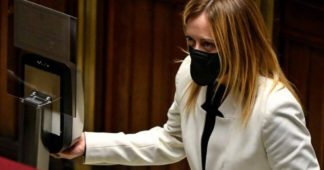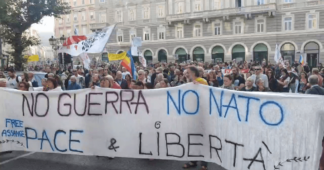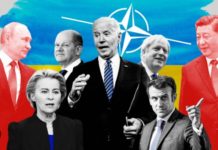ROME, Nov. 6 (Xinhua) — The Italian media on Sunday cast the future of Italy’s military support for Ukraine in its conflict with Russia in doubt, a day after tens of thousands of Italians took to the streets of Rome and Milan to protest against the country’s arms shipment to Ukraine.
Local media reported that protesters held banners, placards and rainbow flags at the events Saturday, demanding negotiation and diplomatic efforts to solve the crisis in Ukraine. “More arms for hugs, no more wars!” read one banner carried by a man who wore a rainbow scarf in Rome.
Italy is a founding member of both the North Atlantic Treaty Organization (NATO) and the European Union (EU) — both of which broadly support financial and military aid for Ukraine.
But amid skyrocketing energy prices and an economic slowdown sparked by the crisis, a growing number of Italians argued that current policies risk prolonging the war while diverting resources the government should be spending domestically.
Local media said the demonstrators included representatives of trade unions, student groups, and cultural associations.
On Friday, foreign ministers from the Group of Seven countries reiterated their vow to continue supporting Ukraine, and new Italian Prime Minister Giorgia Meloni said Italy’s support for Ukraine would not waver and that more weapons would be sent soon.
According to Italian daily Il Sole 24 Ore, the protests have shined a new light on differences among Italian political leadership, with former Italian Prime Minister Giuseppe Conte — now a member of the government opposition — stating Sunday that no more arms would be sent without parliamentary approval.
“We need a breakthrough toward a ceasefire and peace negotiations,” Conte was quoted by media, adding that the current strategy “is only leading toward escalation.”
The debate over the country’s support for Ukraine comes as the new Italian government, which was sworn in on Oct. 22, seeks to hammer out details of the 2023 national budget and lay out strategies for sparking economic growth and curbing record-high inflation.
We remind our readers that publication of articles on our site does not mean that we agree with what is written. Our policy is to publish anything which we consider of interest, so as to assist our readers in forming their opinions. Sometimes we even publish articles with which we totally disagree, since we believe it is important for our readers to be informed on as wide a spectrum of views as possible.











